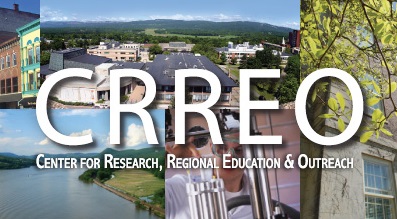CRREO discussion brief looks at food insecurity in the City of Poughkeepsie
The Center for Research, Regional Education and Outreach (CRREO) at the State University of New York at New Paltz has released its eleventh discussion brief titled “Poughkeepsie Plenty: A Community Food Assessment.”
Authored by KT Tobin and Joshua Simons of CRREO, Leonard Nevarez, professor of urban studies at Vassar College, and Susan Grove, coordinator of the Poughkeepsie Plenty Food Coalition, the brief reports the findings of a two-year study of food access and security in the City of Poughkeepsie.
Gerald Benjamin, director of CRREO and associate vice president for regional engagement, says of the report, “This discussion brief is a terrific example of a university/community collaboration to bring an issue of compelling importance to the attention of citizens and community leaders for consideration and action. The findings of this research are important not only for Poughkeepsie but for the entire Hudson Valley region.”
The brief, in part, documents that over one in four (26 percent) City of Poughkeepsie households experienced food insecurity, including eleven percent that are food insecure with hunger. A majority (60 percent) of all City of Poughkeepsie households earning $15,000 or less annually were food insecure.
The location of food stores is a leading contributor to food insecurity. The city has only two grocery stores, both located near the eastern edge of the city limits. About one in ten (12 percent) of city households did not make most of their food purchases at supermarkets or grocery stores. Indeed, two of the city’s ten census tracts qualify as food deserts or areas in which 33 percent of the population (at least 500 people) resides more than one mile from a supermarket and whose median income is less than 80 percent of that of the population as a whole. In this environment, access to transportation is a critical factor. Nearly eight in ten (79 percent) of city households that usually drive themselves to a grocery store are food secure. In contrast, food insecurity characterizes 44 percent of the city households that rely on some other means to go food shopping.
The report concludes that the scope of the food insecurity issues in the City of Poughkeepsie is too large and systemic to be remedied through so-called “emergency” charitable efforts. Rather, the remedy requires a food system approach. They recommend:
- Lifting the four-bag limit set by City of Poughkeepsie buses to allow for families to grocery shop at supermarkets;
- Creation of a “Food Loop,” a bus route that runs with a focus on transporting local residents to and from food stores (and farmer’s markets) on a convenient schedule;
- A mobile farmers’ market, wholesale buying cooperative and/or food recovery initiative; and
- A system of incentives to encourage sale of healthy foods in existing small stores within the city.
“We’ve identified many of the reasons why the problem of food security impacts far too many children, elderly, and families in Poughkeepsie,” said Nevarez. “With the knowledge we’ve drawn from the community food assessment, city residents, civic organizations, local businesses, and elected officials can work effectively toward solving these problems.”
“We are thrilled to have partnered with CRREO to share findings and recommendations that are relevant to many communities in our region,” said Grove. “As this discussion brief so clearly points out, we need to think about income, employment, transportation and other challenges that create barriers to accessing healthy food in our communities. And, we need to continue working together if we are to make our communities increasingly food secure.”
Funded by a USDA Food and Nutrition Service Hunger-Free Communities Assessment and Planning Grant, the members of the teams guiding the Poughkeepsie Plenty research included the Poughkeepsie Farm Project, Cornell Cooperative Extension of Dutchess County, the Dutchess County Department of Health, Dutchess Outreach, Vassar College, and many other agencies, individuals, and local businesses.
CRREO was established in 2007 to further engage SUNY New Paltz and its people with communities, governments, not-for-profits, and businesses across our region. CRREO conducts and publicizes research on regional topics; creates and directs select institutes focusing on specific topics of regional interest; connects and partners with local governments, not-for-profits, and businesses to initiate reforms and advocate for best practices; contracts to assess the performance of public and not-for-profit agencies and programs; and works to foster intergovernmental collaboration and community engagement.

